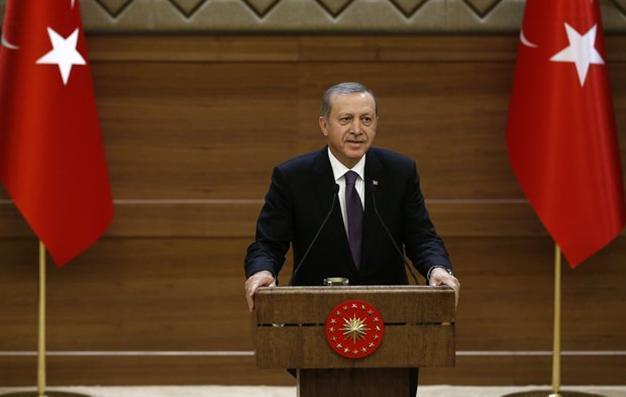Presidential system, new charter back on agenda
ANKARA

AA photo
Turkish President Recep Tayyip Erdoğan has overtly presented the creation of a new constitution that would pave the way for a transition to a presidential system as the number-one item on the agenda of the newly elected legislature.“Turkey’s need to solve the issue of a new constitution was one of the most important messages of Nov. 1. The nation is waiting for this,” Erdoğan said Nov. 4, during a group of neighborhood and village heads (muhtars) at the first of such regular meetings held at his presidential palace since the Nov. 1 snap elections.
Although Erdoğan this time did not directly referred to his long-held, naked ambition to create an executive presidential system, earlier in the same day, his presidential spokesperson, İbrahim Kalın, said Turkey was considering holding a referendum on changing from a parliamentary to a presidential system.
“I hope that they won’t fail to make contributions for preparations for a new constitution in the new period and sit down at the table and solve this issue,” Erdoğan said, calling on all political parties that will be represented in parliament after the Nov. 1 snap elections.
Erdoğan also noted that he had already discussed the issue at a meeting with Prime Minister Ahmet Davutoğlu on Nov. 3.
As a matter of fact, Davutoğlu already raised the issue publicly early on Nov. 2, addressing thousands of people who waited for hours in the cold to hear him speak from the balcony of the headquarters of his Justice and Development Party (AKP) in Ankara.
Hailing the result of the Nov. 1 vote which endowed his party with a legislative majority sufficient to form a single-party government as a “victory for democracy,” Davutoğlu urged Turkey’s political parties to work together on a new constitution, which Erdoğan, the founding leader of the AKP, has said he would like to see include executive powers for the presidency.
“An issue like the presidential system can’t be decided without the nation. If the mechanism requires a referendum, then we will hold a referendum,” Kalın told reporters, adding the change was not simply a personal issue for Erdoğan.
“The executive presidency is not a question of our president’s personal future. He has already entered the history books. The basic motivation is to make the system in Turkey as effective as possible.”
According to unofficial results, the AKP secured 317 seats in the 550-member parliament. For a constitutional change in parliament in favor of the presidential system in line with Erdoğan’s aspirations, the AKP needed to win 367 seats, though 330 seats would be enough to take the issue to a referendum.
On Nov. 3, the AKP’s appeal found conditional support from the Republican People’s Party (CHP), which has clear reservations about a presidential system – a stated goal of the AKP.
‘No break’ in fight against PKK
Erdoğan, meanwhile, pledged that Turkey would press ahead with a military campaign against militants of the outlawed Kurdistan Workers’ Party (PKK), while underlining that the campaign was not meant to target his “Kurdish siblings,” and solely targeted “terrorists.”
“The operations against the terrorist organization inside and outside the country are continuing in a determined fashion,” Erdoğan said. “There will be no break. We will continue on.”
As part of the operations, the Turkish Human Rights Foundation (TİHV) reported that five people had been killed by security services in the southeast on Nov. 3 alone, along with another person on Nov. 4.
“The upcoming period is not a period for talk and discussion. I’m saying openly; it is a period for obtaining results. If a name is absolutely sought, then the name of this period is from now on ‘National Unity and Fraternity Process,’” he said, indicating that a return to the long-stalled peace process aimed at ending the three-decade conflict between security forces and the PKK in its original format was a low possibility, at least for now.
















